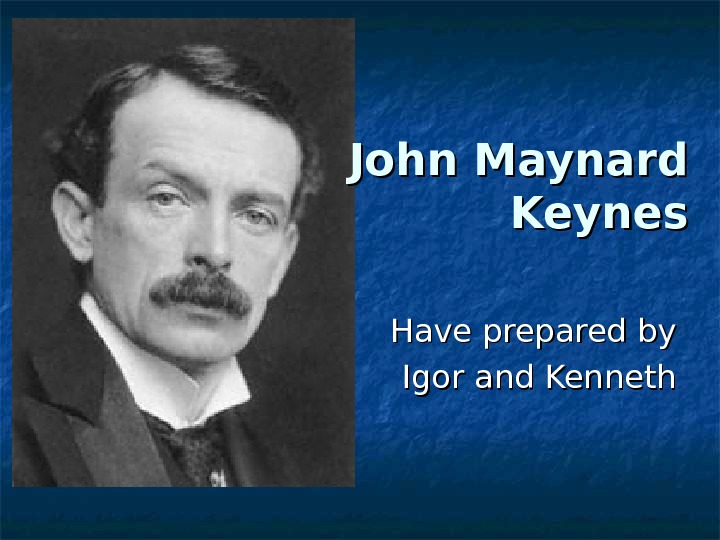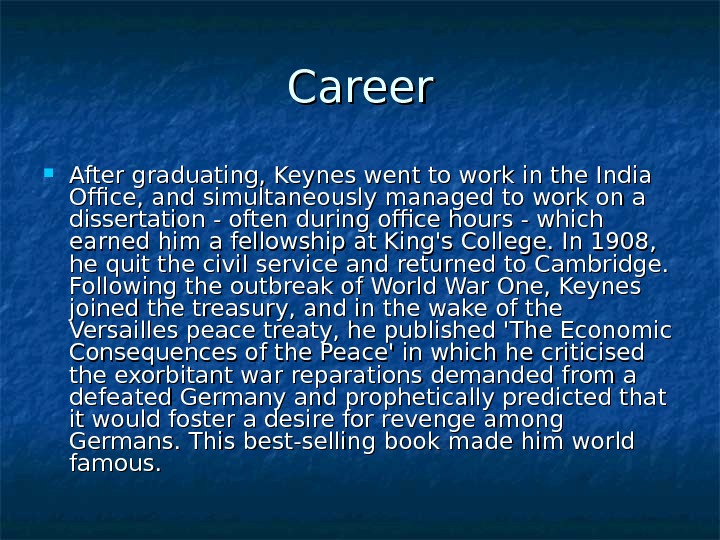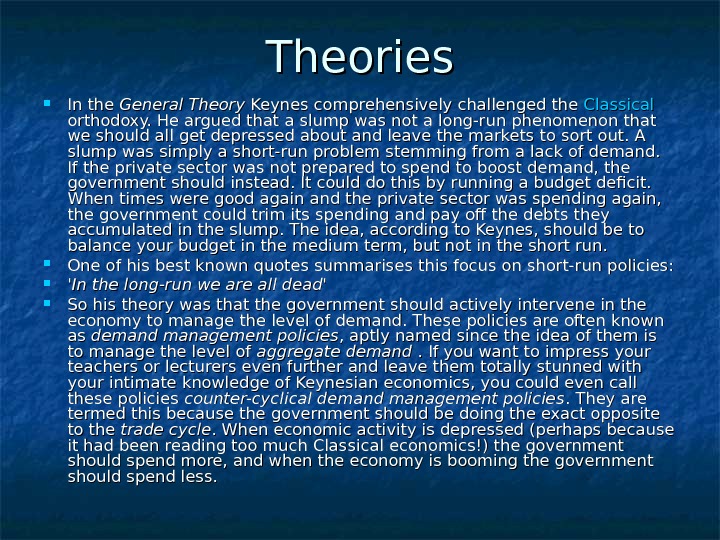John Maynard Keynes Have prepared by Igor and





- Размер: 120.5 Кб
- Количество слайдов: 4
Описание презентации John Maynard Keynes Have prepared by Igor and по слайдам
 John Maynard Keynes Have prepared by Igor and Kenneth
John Maynard Keynes Have prepared by Igor and Kenneth
 Childhood John Maynard Keynes was born on 5 June 1883 in Cambridge into a well-to-do academic family. His father was an economist and a philosopher, his mother became the town’s first female mayor. He excelled academically at Eton as well as Cambridge University, where he studied mathematics. He also became friends with members of the Bloomsbury group of intellectuals and artists.
Childhood John Maynard Keynes was born on 5 June 1883 in Cambridge into a well-to-do academic family. His father was an economist and a philosopher, his mother became the town’s first female mayor. He excelled academically at Eton as well as Cambridge University, where he studied mathematics. He also became friends with members of the Bloomsbury group of intellectuals and artists.
 Career After graduating, Keynes went to work in the India Office, and simultaneously managed to work on a dissertation — often during office hours — which earned him a fellowship at King’s College. In 1908, he quit the civil service and returned to Cambridge. Following the outbreak of World War One, Keynes joined the treasury, and in the wake of the Versailles peace treaty, he published ‘The Economic Consequences of the Peace’ in which he criticised the exorbitant war reparations demanded from a defeated Germany and prophetically predicted that it would foster a desire for revenge among Germans. This best-selling book made him world famous.
Career After graduating, Keynes went to work in the India Office, and simultaneously managed to work on a dissertation — often during office hours — which earned him a fellowship at King’s College. In 1908, he quit the civil service and returned to Cambridge. Following the outbreak of World War One, Keynes joined the treasury, and in the wake of the Versailles peace treaty, he published ‘The Economic Consequences of the Peace’ in which he criticised the exorbitant war reparations demanded from a defeated Germany and prophetically predicted that it would foster a desire for revenge among Germans. This best-selling book made him world famous.
 Theories In the General Theory Keynes comprehensively challenged the Classical orthodoxy. He argued that a slump was not a long-run phenomenon that we should all get depressed about and leave the markets to sort out. A slump was simply a short-run problem stemming from a lack of demand. If the private sector was not prepared to spend to boost demand, the government should instead. It could do this by running a budget deficit. When times were good again and the private sector was spending again, the government could trim its spending and pay off the debts they accumulated in the slump. The idea, according to Keynes, should be to balance your budget in the medium term, but not in the short run. One of his best known quotes summarises this focus on short-run policies: ‘In the long-run we are all dead’ So his theory was that the government should actively intervene in the economy to manage the level of demand. These policies are often known as as demand management policies , aptly named since the idea of them is to manage the level of aggregate demand . If you want to impress your teachers or lecturers even further and leave them totally stunned with your intimate knowledge of Keynesian economics, you could even call these policies counter-cyclical demand management policies. They are termed this because the government should be doing the exact opposite to the trade cycle. When economic activity is depressed (perhaps because it had been reading too much Classical economics!) the government should spend more, and when the economy is booming the government should spend less.
Theories In the General Theory Keynes comprehensively challenged the Classical orthodoxy. He argued that a slump was not a long-run phenomenon that we should all get depressed about and leave the markets to sort out. A slump was simply a short-run problem stemming from a lack of demand. If the private sector was not prepared to spend to boost demand, the government should instead. It could do this by running a budget deficit. When times were good again and the private sector was spending again, the government could trim its spending and pay off the debts they accumulated in the slump. The idea, according to Keynes, should be to balance your budget in the medium term, but not in the short run. One of his best known quotes summarises this focus on short-run policies: ‘In the long-run we are all dead’ So his theory was that the government should actively intervene in the economy to manage the level of demand. These policies are often known as as demand management policies , aptly named since the idea of them is to manage the level of aggregate demand . If you want to impress your teachers or lecturers even further and leave them totally stunned with your intimate knowledge of Keynesian economics, you could even call these policies counter-cyclical demand management policies. They are termed this because the government should be doing the exact opposite to the trade cycle. When economic activity is depressed (perhaps because it had been reading too much Classical economics!) the government should spend more, and when the economy is booming the government should spend less.

